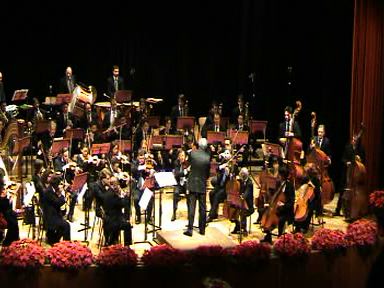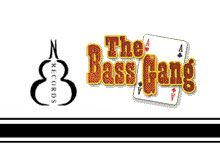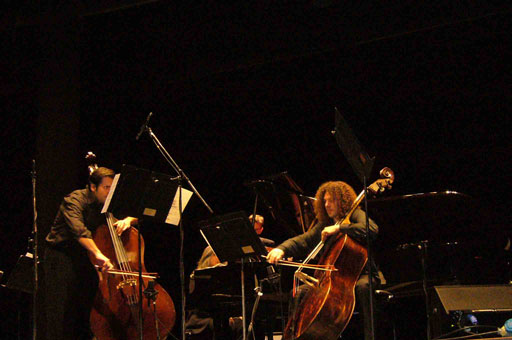Standing Ovation for “national“ Petracchi
 Again this year, for the twentieth inauguaral concert for New Year, “sold out” says it all. The concert was organised by the International Music Campus, at the Theatre “G. d’Annunzio, again conducted, as is traditional, by the now legendary maestro Franco Petracchi. It was a concert that displayed cheerfulness and entertainment as well as splendid music. With his charisma and his and his intelligent humour, Petracchi knew how to capture the attention of the audience, eliciting their participition during the course of the evening, involving them during the performance and fascinating them with information, anecdotes and hitherto unknown curiosities about the world of music and musicians. After an extremely patriotic opening to the concert with a performance of the national anthem, sung by the audience and by the conductor himself, what followed was no less “triumphal” Again this year, for the twentieth inauguaral concert for New Year, “sold out” says it all. The concert was organised by the International Music Campus, at the Theatre “G. d’Annunzio, again conducted, as is traditional, by the now legendary maestro Franco Petracchi. It was a concert that displayed cheerfulness and entertainment as well as splendid music. With his charisma and his and his intelligent humour, Petracchi knew how to capture the attention of the audience, eliciting their participition during the course of the evening, involving them during the performance and fascinating them with information, anecdotes and hitherto unknown curiosities about the world of music and musicians. After an extremely patriotic opening to the concert with a performance of the national anthem, sung by the audience and by the conductor himself, what followed was no less “triumphal”
Immediately, with Strauss’s Die Fledemaus, all the energy that Petracchi is ready to put at the service his orchestra, of his music and of his audience, was manifested – with the audience on this occasion seeming to adore him at once. How can one not adore a director who who between one piece and another turns with a smile to the audience to to give a historical introduction of the next piece and to explain its presence in the programme, accompanying all with information and with jokes full of the greatest irony? After the first piece came the first brainwave if the conductor: to get the musicians, divided according to their instrumental groups, to play some brief pieces, characteristic or otherwise of the instrument of the instrument in question, as a present, a personal greeting in this way to the audience. In his short time one could hear the “greetings“ of the violins by way of the notes of Spring, those of the violas with the a Neopolitan bsong, of the cellos expressed in Shostakovitch’s Waltz, and finally those of the double basses which, led by the maestro Andrea Pighi, gave us a taste of contemporary music with an extract from a piece taken from the repetoire of the Bass Gang.
 After this Petracchi basic thread underlying the selection of pieces chosen for the concert. The maestro then proposed a tour of the major cities of musical history, setting out from Vienna and arriving in Moscow via Paris. The maestro’s inclusion of an Italian composer was splendid,; and it was characteristic of him to include Rossini’s Cinderella Symphony, an unusual piece for a New Year concert. Petracchi justified his choice with his desire to have at least one Italian musician represented in the programme and who other than Rossinin could best represent Italy alongside Strauss, Gounod and Tchaikovsky (all musicians, moreover, that for him are contemporary)? After this Petracchi basic thread underlying the selection of pieces chosen for the concert. The maestro then proposed a tour of the major cities of musical history, setting out from Vienna and arriving in Moscow via Paris. The maestro’s inclusion of an Italian composer was splendid,; and it was characteristic of him to include Rossini’s Cinderella Symphony, an unusual piece for a New Year concert. Petracchi justified his choice with his desire to have at least one Italian musician represented in the programme and who other than Rossinin could best represent Italy alongside Strauss, Gounod and Tchaikovsky (all musicians, moreover, that for him are contemporary)?
Accompanying the Rossini piece was the anecdote about the secret recipe that Rossini used to prepare for New Year and which Petracchi, a great Gourmet, recommended that the audience should try: his Famous “lobsters with Parmaham”!
Thus the concert progressed, always con brio: Petracchi’s dynamism became ever more contagious. With his gestures, always expansive without ever losing elegance, he continued to carry the audience along with him.
Before Strauss’s Polka we heard a new anecdote about this composer’s maniacal observation of tempo: In connection with this, the conductor astonished the audience by producing a metronome which he put in front of the orchestra, and before proceeding with all vitality with the music.
Petracchi was not only the conductor of the orchestra and animator of the evening but often took on the role of historian, introducing each piece with interesting information about its composition and technical characteristics, maintaining a high level of attention in an audience already enchanted by the spectacular personality of the excellent conductor. At the mid-point of the concert came the big surprise: to the strains of Roma nun fa la stupida stasera (Rome will not play the fool this evening), the maestro Armando Trovaioli, illustrious personality if the twentieth-century Italian musical scene, not to mention great friend of Petracchi, came onto the podium. The conductor told anecdotes about Trovaioli, who, we recall, has written a double bass concerto for Petracchi, another performance of which, it was suggested, could occur in the near future.
The concerto proceeded with a consistent level of vitality to the end, when the indefaticable audience called for three encores; of which one was inevitably the Radetky March which triumphantly concluded an equally triumphant concert. Once again Petracchi demonstrated himself to be a great musician, a sensitive orchestral conductor, powerfully involved -
as transpires in all his gestures - an unflagging inspirer of instrumentalists and crowds, but above all a supreme Maestro.
Silvia Mattei |




 Again this year, for the twentieth inauguaral concert for New Year, “sold out” says it all. The concert was organised by the International Music Campus, at the Theatre “G. d’Annunzio, again conducted, as is traditional, by the now legendary maestro Franco Petracchi. It was a concert that displayed cheerfulness and entertainment as well as splendid music. With his charisma and his and his intelligent humour, Petracchi knew how to capture the attention of the audience, eliciting their participition during the course of the evening, involving them during the performance and fascinating them with information, anecdotes and hitherto unknown curiosities about the world of music and musicians. After an extremely patriotic opening to the concert with a performance of the national anthem, sung by the audience and by the conductor himself, what followed was no less “triumphal”
Again this year, for the twentieth inauguaral concert for New Year, “sold out” says it all. The concert was organised by the International Music Campus, at the Theatre “G. d’Annunzio, again conducted, as is traditional, by the now legendary maestro Franco Petracchi. It was a concert that displayed cheerfulness and entertainment as well as splendid music. With his charisma and his and his intelligent humour, Petracchi knew how to capture the attention of the audience, eliciting their participition during the course of the evening, involving them during the performance and fascinating them with information, anecdotes and hitherto unknown curiosities about the world of music and musicians. After an extremely patriotic opening to the concert with a performance of the national anthem, sung by the audience and by the conductor himself, what followed was no less “triumphal” After this Petracchi basic thread underlying the selection of pieces chosen for the concert. The maestro then proposed a tour of the major cities of musical history, setting out from Vienna and arriving in Moscow via Paris. The maestro’s inclusion of an Italian composer was splendid,; and it was characteristic of him to include Rossini’s Cinderella Symphony, an unusual piece for a New Year concert. Petracchi justified his choice with his desire to have at least one Italian musician represented in the programme and who other than Rossinin could best represent Italy alongside Strauss, Gounod and Tchaikovsky (all musicians, moreover, that for him are contemporary)?
After this Petracchi basic thread underlying the selection of pieces chosen for the concert. The maestro then proposed a tour of the major cities of musical history, setting out from Vienna and arriving in Moscow via Paris. The maestro’s inclusion of an Italian composer was splendid,; and it was characteristic of him to include Rossini’s Cinderella Symphony, an unusual piece for a New Year concert. Petracchi justified his choice with his desire to have at least one Italian musician represented in the programme and who other than Rossinin could best represent Italy alongside Strauss, Gounod and Tchaikovsky (all musicians, moreover, that for him are contemporary)?